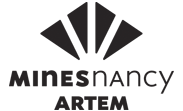École nationale supérieure des mines de Nancy
 |
|
| Type | Grandes Ecoles |
|---|---|
| Established | 1919 |
| Students | 803 |
| Location | Nancy, France |
| Campus | Nancy, ARTEM |
| Affiliations | Groupe des écoles des mines, Artem, INPL |
| Website | www |
Mines Nancy (École Nationale Supérieure des Mines de Nancy; also referred to as ENSMN, Ecole des Mines de Nancy or Mines Nancy) is one of the French generalist engineering Grandes Ecoles.
It is located in the campus Artem, in the city of Nancy, Eastern France ( it takes just 1h30 from Paris with TGV), and is part of the University of Lorraine. Around 400 students are taught general science and management and 300 follow specialised Master programs. These students are taught by 60 permanent professors. There are also 400 researchers including an hundred doctorants. Despite its small size, it is well represented in the French industry. Most of its students hold executive positions in the industry and large corporations or scientific research positions in France or abroad.
It was created in 1919 on the request of the University of Nancy in order to contribute to the reconstruction of the mining and steel industry in the east of France after World War I. At the end of the 1950s, under the impulse of its then-director Bertrand Schwartz (younger brother of Laurent Schwartz), the school reorganized its curriculum to include a balanced blend of engineering, management and social sciences. At the time, it was an innovative educational model for engineers, that was later extended to other Grandes Ecoles.
The school was initially aimed at training mining engineers. In 1957, its director Bertrand Schwartz began its transformation into a modern "generalist" school. The school focuses on training innovative managers for the industry and researchers, with a broad generalist and high scientific knowledge, able to communicate in different languages. The Ingénieurs civils des Mines degree (Master of Science and Executive Engineering), is ranked among the best French Grande Ecole degrees. 20% of the students are international students, mainly from Morocco, Tunisia and China. In addition to the general science (advanced mathematics and physics) and management classes, the students have to specialise (one third of their classes) from their second year to the third (and last) year:
The students must learn English and at least another language.
The students have to do at least three internships in order to get the degree.
The engineer internship is usually an opportunity for the companies to hire the students.
...
Wikipedia
